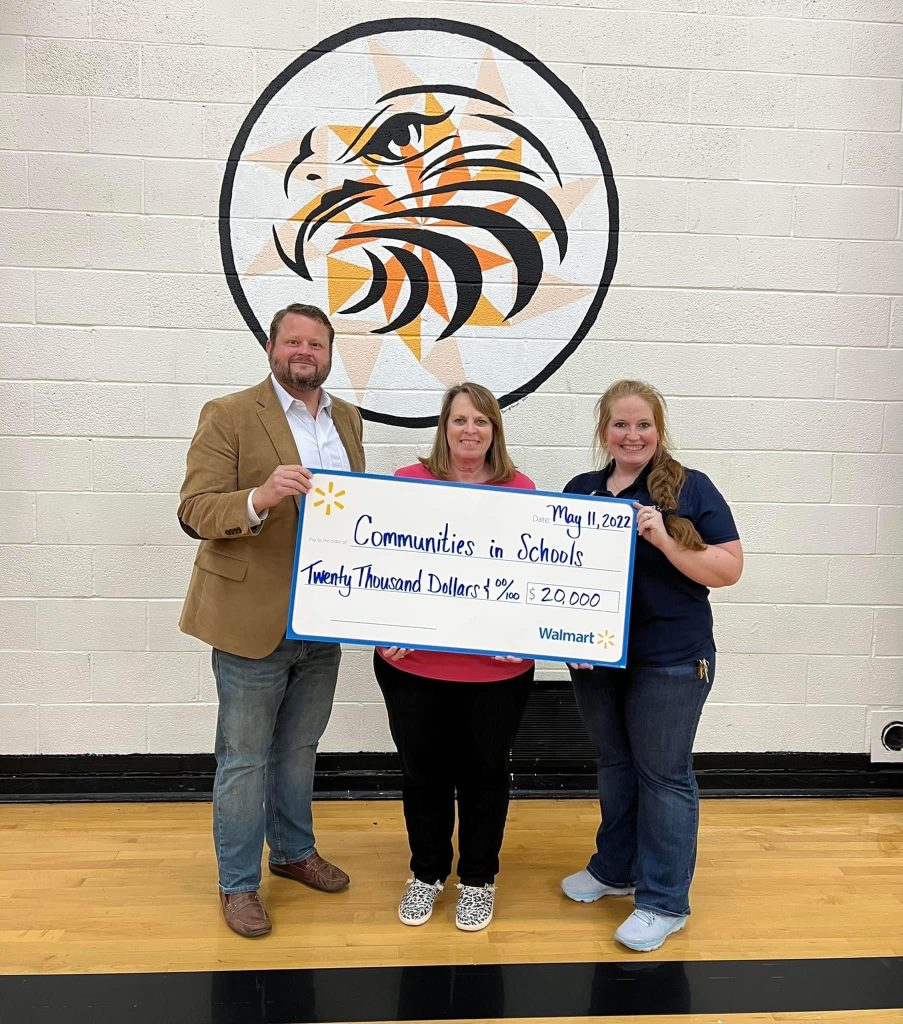
Uniontown Public Schools and Heather Magruder, Walmart Fort Scott Store Manager.
Two Bourbon County school districts recently received a $10,000 grant each for student support from Walmart to help with the Communities In Schools programs.
The mission of Communities In Schools is to surround students with a community of support, empowering them to stay in school and achieve in life, according to https://www.communitiesinschools.org/.
The name of the grant is the Walmart Community Grant – Communities In Schools Programming in Uniontown and Fort Scott, Kansas
Rhonda Hoener is the Student Support Coordinator for Communities In Schools at Uniontown, and wrote the grant proposal.
Her counterparts in USD 234, are Lewis Dunkeson at Fort Scott High School and Winter Moore at Fort Scott Middle School.
Walmart presented the check for $20,000 to Communities In Schools via Hoener, recently.
“This grant will support our work helping more than 1,400 students and their families served by Communities In Schools of Mid-America programming in Uniontown and Fort Scott, Kansas,” according to a press release, from Cheri Faunce, Vice President of Resource Development for Communities in School of Mid-America and Victoria Partidge, Vice President of Communications.
“Communities In Schools of Mid-America is addressing the academic and non-academic impacts due to the extended time out of school buildings from the COVID-19 pandemic,” according to the press release. “Our program works by building trusting relationships, re-engaging students in the learning process, and helping students identify and break down barriers preventing them from reaching their goals.”
The Student Support Coordinators (SSCs) provide whole-school programming to promote a positive school climate and combat risk factors.
Youth risk factors include low attendance, student and parent disengagement, and access to basic needs such as food, clothing, school supplies, hygiene products.
SSCs also work one-to-one with a minimum of 55 caseload students per school to help with academic, attendance, and/or behavior/social-emotional concerns and the students are at high risk for dropping out.
Examples of programming include, but are not limited to, lunch hour mentoring, life/social skills, behavioral interventions, resource referrals to other social service providers, and grief support.
In the Uniontown program, Hoener has helped with:
- Family Engagement Night at West Bourbon Elementary School
- Guest speaker Julia Cook at WBE
- Attendance incentives at Uniontown Junior and Senior High School
- Guest speaker Mark Potter at UHS/UJH
- Both buildings provided are provided with basic need items
For caseload students only, she has helped wit:
- Academic support
- Behavior support
- Social emotional learning support
- Attendance support
- Referrals to other agencies
- Utility/rent/ grocery/gas assistance to families
- College visit
- College/career conversations with outside agencies
At Fort Scott Middle School, Winter has helped with:
- – School-wide academic incentives
- – One-on-one behavior intervention
- – Homework assistance
- – Individual grade and attendance checks
- – Basic needs distribution (school supplies, food, snacks, hygiene products)
At Fort Scott High School, Dunkeson has helped with:
- – FutureNow: Finance
- – Career Fair
- – Homework assistance
- – Individual grade and credit checks
- – Mentoring program
- – Basic needs distribution (school supplies, food, snacks, hygiene products)